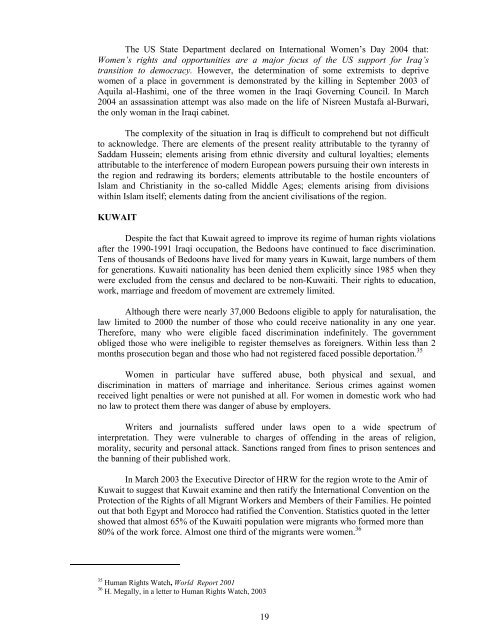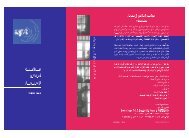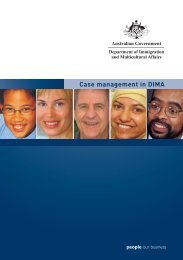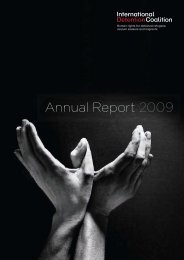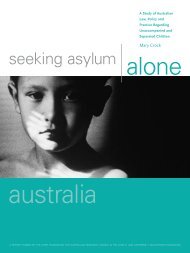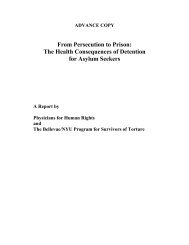DEPORTED TO DANGER - Edmund Rice Centre
DEPORTED TO DANGER - Edmund Rice Centre
DEPORTED TO DANGER - Edmund Rice Centre
Create successful ePaper yourself
Turn your PDF publications into a flip-book with our unique Google optimized e-Paper software.
The US State Department declared on International Women’s Day 2004 that:Women’s rights and opportunities are a major focus of the US support for Iraq’stransition to democracy. However, the determination of some extremists to deprivewomen of a place in government is demonstrated by the killing in September 2003 ofAquila al-Hashimi, one of the three women in the Iraqi Governing Council. In March2004 an assassination attempt was also made on the life of Nisreen Mustafa al-Burwari,the only woman in the Iraqi cabinet.The complexity of the situation in Iraq is difficult to comprehend but not difficultto acknowledge. There are elements of the present reality attributable to the tyranny ofSaddam Hussein; elements arising from ethnic diversity and cultural loyalties; elementsattributable to the interference of modern European powers pursuing their own interests inthe region and redrawing its borders; elements attributable to the hostile encounters ofIslam and Christianity in the so-called Middle Ages; elements arising from divisionswithin Islam itself; elements dating from the ancient civilisations of the region.KUWAITDespite the fact that Kuwait agreed to improve its regime of human rights violationsafter the 1990-1991 Iraqi occupation, the Bedoons have continued to face discrimination.Tens of thousands of Bedoons have lived for many years in Kuwait, large numbers of themfor generations. Kuwaiti nationality has been denied them explicitly since 1985 when theywere excluded from the census and declared to be non-Kuwaiti. Their rights to education,work, marriage and freedom of movement are extremely limited.Although there were nearly 37,000 Bedoons eligible to apply for naturalisation, thelaw limited to 2000 the number of those who could receive nationality in any one year.Therefore, many who were eligible faced discrimination indefinitely. The governmentobliged those who were ineligible to register themselves as foreigners. Within less than 2months prosecution began and those who had not registered faced possible deportation. 35Women in particular have suffered abuse, both physical and sexual, anddiscrimination in matters of marriage and inheritance. Serious crimes against womenreceived light penalties or were not punished at all. For women in domestic work who hadno law to protect them there was danger of abuse by employers.Writers and journalists suffered under laws open to a wide spectrum ofinterpretation. They were vulnerable to charges of offending in the areas of religion,morality, security and personal attack. Sanctions ranged from fines to prison sentences andthe banning of their published work.In March 2003 the Executive Director of HRW for the region wrote to the Amir ofKuwait to suggest that Kuwait examine and then ratify the International Convention on theProtection of the Rights of all Migrant Workers and Members of their Families. He pointedout that both Egypt and Morocco had ratified the Convention. Statistics quoted in the lettershowed that almost 65% of the Kuwaiti population were migrants who formed more than80% of the work force. Almost one third of the migrants were women. 3635 Human Rights Watch, World Report 200136 H. Megally, in a letter to Human Rights Watch, 200319


